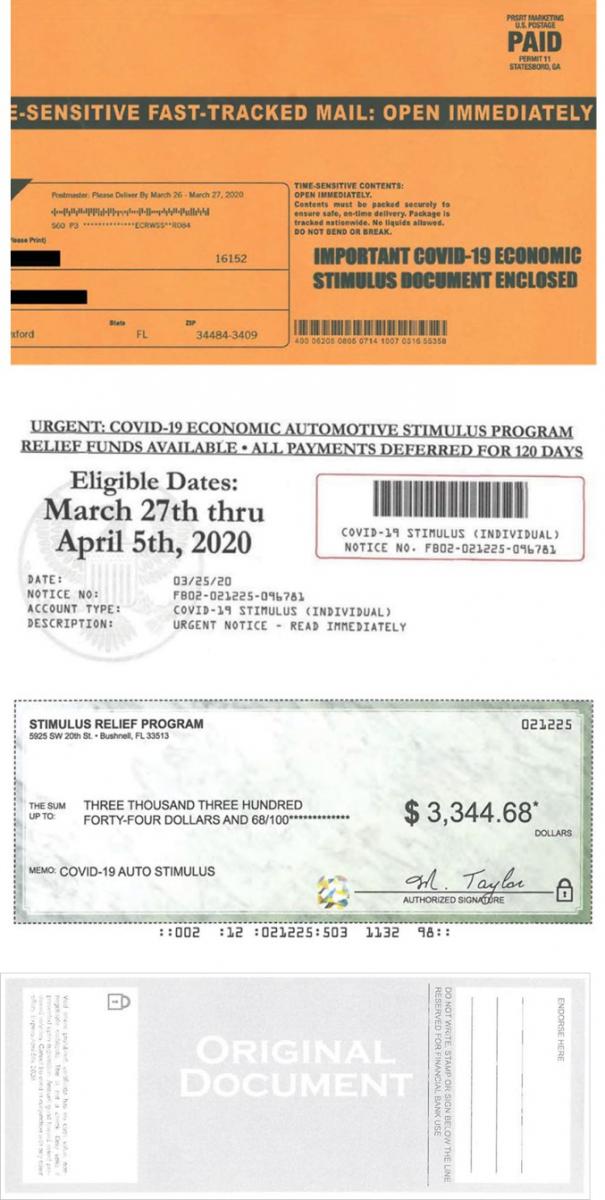The beige envelope says IMPORTANT COVID-19 ECONOMIC STIMULUS DOCUMENT ENCLOSED. Inside – next to what appears to be the Great Seal of the United States – is the phrase COVID-19 STIMULUS (INDIVIDUAL) and a 16-digit serial number. The mailer also includes a check purporting to be from the “Stimulus Relief Program.” Is it official information affiliated with a COVID-19 economic stimulus program? We won’t leave you in suspense. It’s a car ad.
 The FTC just filed suit against Louisiana-based Traffic Jam Events, LLC, and its founder David J. Jeansonne II. The defendants are in the business of running tent sales and other promotions on behalf of auto dealers and advertising those events through direct mail.
The FTC just filed suit against Louisiana-based Traffic Jam Events, LLC, and its founder David J. Jeansonne II. The defendants are in the business of running tent sales and other promotions on behalf of auto dealers and advertising those events through direct mail.
One Traffic Jam-created mailer cited in the FTC lawsuit states URGENT: COVID-19 ECONOMIC AUTOMOTIVE STIMULUS PROGRAM RELIEF FUNDS AVAILABLE and directs people to visit the local “relief headquarters” to “claim these stimulus incentives.” The mailer lists “Mandatory qualifications to receive Stimulus Relief Funds” – status as a permanent U.S. resident, a valid driver’s license, and an annual income of no more than $91,300. The enclosed “check” for $3,344.68 from the STIMULUS RELIEF PROGRAM uses the memo line COVID-19 AUTO STIMULUS.
That’s what the mailer says, but here are the facts:
There is no “COVID-19 auto stimulus.” The “relief headquarters” is the address of a car tent sale. That isn’t an economic stimulus check. It isn’t even a check. And the promotion has nothing whatsoever to do with any government stimulus program.
The lingo sounds similar to official programs affiliated with the CARES Act and the FTC alleges that’s no accident. According to the complaint, the defendants falsely claim that consumers are receiving official COVID-19 economic stimulus information, including checks. What’s more, they falsely claim an affiliation or association with the government.
The FTC says this isn’t the defendants’ first ride around the law enforcement block. The State of Kansas sued them in 2010 and 2012 for using deceptive ad campaigns. Indiana took action against them in 2018. And despite the fact that the Florida Attorney General sued them in April for using deceptive COVID-related mailers, the defendants continue to provide advertising and marketing services to the automotive industry nationwide.
The case is pending in federal court in Louisiana. Even at this early stage, the law enforcement action sends some loud-and-clear messages.
Making misleading COVID-related claims to sell stuff violates the law. “Illegal” may be the nicest adjective we can come up with to describe the defendants’ tactics. At a time when businesses and consumers are fighting to get on firmer financial footing, falsely claiming a connection to legitimate economic stimulus programs is a particularly cynical form of deception.
Marketing companies are subject to the FTC’s prohibition on deceptive and unfair practices. The scope of the FTC Act is broad and in appropriate cases, the FTC has taken action against illegal conduct by advertising agencies, public relations firms, industry-specific promotional businesses, and others in the marketing ecosystem. What’s more, FTC cases have named officers of those companies not just in their corporate capacities, but as individuals, too.
Consider the company you keep. Savvy consumer-facing businesses steer clear of outfits that encourage the use of deceptive sales tactics. Don’t put your good name at risk by engaging a marketing firm with a questionable track record.
